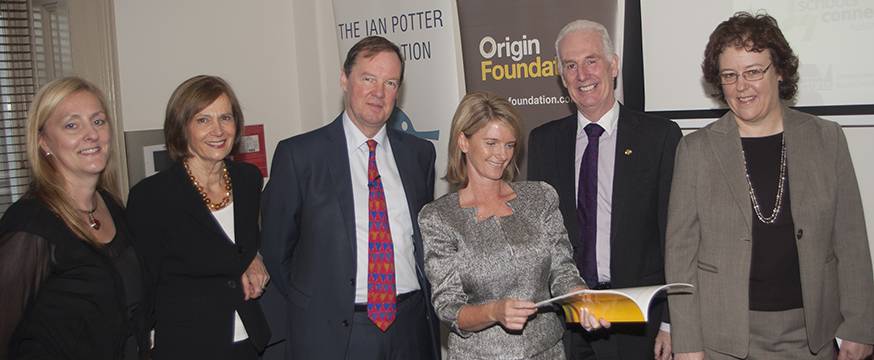
Putting collaboration into practice
Research 5 Jun 2013 5 minute readThe guide is the product of a collaborative research project between ACER, The Ian Potter Foundation and Origin Foundation, called Leading Learning in Education and Philanthropy (LLEAP). The LLEAP Dialogue Series guide is designed as a flexible, user-friendly tool to help different groups within education and philanthropy to form and foster partnerships focused on growing educational projects to maximise impact.
Opening the forum, Victorian Minister for Education, Martin Dixon said partnerships are a key part of education.
‘The education of our young people is a partnership, is a community responsibility,’ Mr Dixon said.
‘Everybody’s got a part to play in it. It’s not just one particular group’s responsibility: it’s not just the responsibility of parents; it’s not just the responsibility of schools, or governments or the community within which the school is actually situated.
‘Because we’re educating young people for a future and as members of a community – whether it’s a local community, a state community, or world community – everybody has a stake in education and, therefore, we all have to do what we are best at doing together with each of our talents and what we can all bring to the table,’ Mr Dixon said.
Mr Dixon’s sentiments were echoed by visiting academic Professor Bill Lucas, Co-Director of the Centre for Real-World Learning at the University of Winchester, who in his presentation said, ‘Helping learners thrive is the country’s job, not any one institution or any one individual.’
Professor Lucas told the forum that there is an instinct hard-wired into the human species to collaborate, describing it as the ‘social glue’.
‘We hear a lot about partnerships and a lot about collaboration, and the devil, I think, is in the detail about how we do that,’ Professor Lucas said.
Professor Lucas spoke extensively about collaboration and engagement as vehicles for positive change, and discussed some of the barriers that affect the ability of individuals and groups to engage.
‘Collaboration on a Monday morning is working with people who aren’t like you,’ Professor Lucas said.
‘We are all irritatingly different. “If only everyone was like me, then it would be so much easier to work with them,” but of course we’re not.
‘When you’re working with colleagues it will slow you down at first, so expect it! Expect it will slow you down, and you’ll go deeper and you’ll do more worthwhile, more complex work as a consequence,’ Professor Lucas said.
Writing in the LLEAP Dialogue Series, Professor Lucas said we know that schools and not-for-profits want philanthropy to open up new horizons to them, and that philanthropics want to be catalysts for change.
‘For the sake of all learners we simply have to put collaboration into practice,’ he wrote, adding at the forum that people should ‘just do it’.
‘It’s a myth to say that you have to be completely signed up to something before you do it. Just relax a bit and do it thoughtfully and reflect as you’re going. If you make too big a deal of it then I think maybe we miss the chance,’ Professor Lucas told the forum.
LLEAP Dialogue Series co-author, ACER Principal Research Fellow Dr Michelle Anderson, picked up this thread in her closing address, saying, while ‘just doing it’ can be a challenge, ‘We can wait or we can get out there and make connections for ourselves.’
‘It’s a way of taking the first of a hundred steps in a positive direction,’ Dr Anderson said.
Just as Professor Lucas had earlier asked each person to think about one thing that they might try out differently, Dr Anderson asked everyone to reflect upon what they are doing that is mutually reinforcing to the bigger goal of improving outcomes for learners.
‘What are you doing to create the conditions necessary for others to succeed?’ Dr Anderson said.
Further information:
The LLEAP Dialogue Series (Year 2) was launched at the Melbourne central office of the Victorian Department of Education and Early Childhood Development on Tuesday 23 April 2013. For further information on the Leading Learning in Education and Philanthropy (LLEAP) study and to download a free copy of the LLEAP Dialogue Series visit <www.acer.edu.au/lleap>
Photo by Peter Mills, Audio Image Solutions.
